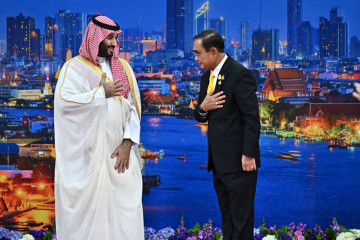

As ties between Saudi Arabia and the United States have frayed in recent years, the kingdom has looked eastward to expand its network of allies beyond its traditional partnership with the Western world.
The news media has paid the most notice to the budding Saudi alliance with China, the United States’ greatest rival in the Global South.
Even so, analysts and journalists have devoted less attention to Saudi Arabia’s outreach to Thailand, a fellow kingdom whose sphere of influence in Southeast Asia could make it a crucial Saudi partner.
"Saudi Arabia has rewarded Thailand not only with economic engagement but also by turning a blind eye to Prayut’s own abuses"
In November, Mohammed bin Salman, Saudi Arabia’s crown prince and de facto ruler, met with Thai Prime Minister Prayut Chan-o-cha in Bangkok.
During bin Salman’s time there, Saudi and Thai officials reached deals on bilateral trade, energy, foreign direct investment, and tourism.
Ratchada Thanadirek, a spokesman for the Prayut administration, lauded “cooperation in trade, investment, and labour” that he described as “already underway,” comments echoed by the Saudi side.
The growing partnership between Saudi Arabia and Thailand predates bin Salman’s November trip.
Last May, Saudi Aramco announced a memorandum of understanding with PTT, a Thai state-owned enterprise, “to strengthen cooperation across crude oil sourcing and the marketing of refining and petrochemical products and liquefied natural gas.”
Five months later, a golf course north of Bangkok played host to a tournament for LIV Golf, a professional golf tour bankrolled by the Saudi Public Investment Fund, a government agency chaired by bin Salman.
While Saudi Arabia and Thailand have plenty of shared national interests, Prayut has likely improved his standing by overlooking bin Salman’s excesses.
The Thai prime minister has betrayed little concern about bin Salman’s persecution of dissidents at home or his misadventures abroad, which culminated in an ongoing intervention in Yemen and the 2018 assassination of the journalist Jamal Khashoggi in Turkey, moves much criticised in the West.
Saudi Arabia has rewarded Thailand not only with economic engagement but also by turning a blind eye to Prayut’s own abuses.
Prayut, the commander-in-chief of the Royal Thai Army until 2014, launched a coup d’état that year and has led Thailand with an iron fist ever since – a legacy that has tempered his relationship with the West.
Saudi Arabia seems to have few qualms about Prayut’s past or his more recent crackdowns on protests. Bin Salman has also ignored the repression of the Muslim minority in Thailand, a Buddhist-majority country.
For decades, insurgents in Southern Thailand, a region dominated by Muslim Malays, have agitated for autonomy or independence.
The Thai military has often responded with brutality, facing accusations of torture and extrajudicial killings.
This approach to counterinsurgency has elicited condemnation from Amnesty International and Human Rights Watch and even sparked an extraordinary diplomatic intervention by the Organization of Islamic Cooperation.
"Saudi Arabia seems to have few qualms about Prayut’s past or his more recent crackdowns on protests. Bin Salman has also ignored the repression of the Muslim minority in Thailand, a Buddhist-majority country"
Saudi officials have shown themselves willing to look past Thailand’s heavy-handed response to the insurgency, an echo of bin Salman’s controversial rhetorical support for China’s oppression of its own Muslim minority.
Nonetheless, Saudi Arabia’s developing alliance with Thailand stands out because the two countries once found themselves at odds. Saudi Arabia only agreed to exchange ambassadors with Thailand again last year, after a three-decade hiatus that represented one of the strangers, more obscure diplomatic disputes in Asian history.
|
Saudi Arabia first downgraded its relations with Thailand in the aftermath of the Blue Diamond Affair, a 1989 scandal in which a Thai janitor absconded with tens of millions of dollars in jewels from a Saudi palace.
The murders of three Saudi diplomats in Bangkok the next year further soured ties. During a visit to Riyadh last January, Prayut voiced “sincere regret over the tragic events in Thailand between 1989 and 1990,” and Saudi Arabia restored full ties.
The future of Saudi engagement with Thailand seems bright. Last year, Saudi Arabia’s chargé d'affairs in Bangkok held dinner parties to celebrate the Thai-Saudi Parliamentary Friendship Committee and commemorate the Riyadh Chamber of Commerce’s role in the Saudi-Thai Investment Forum.
Saudi and Thai officials also organised a ceremony for Thai pilgrims departing for the Hajj, a demonstration of the ways in which Saudi Arabia and Thailand are now integrating cultural diplomacy into a partnership rooted in economics and mutual self-interest.
In a recent article, the Saudi Press Agency, part of Saudi Arabia’s state media, heralded bin Salman’s November stop in Bangkok as the start of an era of “new relations and fruitful cooperation in various fields.”
The news agency observed that Saudi Arabia had exported $4.83 billion in goods to Thailand in 2021, adding that “the Kingdom ranks 14th in the list of trading partners for Thailand's imports,” a sign of Saudi Arabia’s growing economic foothold there.
With any diplomatic issues resolved, Saudi Arabia and Thailand’s relationship seems likely to expand further.
That alliance, in turn, will give Saudi Arabia yet another alternative to the West and in particular the United States, which has hesitated to extend its full backing to the kingdom. In Prayut, bin Salman has found a business partner on whom he can expect to rely.
![Thailand Prime Minister Prayut Chan-o-cha and Crown Prince and Prime Minister of Saudi Arabia Mohammed bin Salman Al Saud attend the APEC Economic Leaders Informal Dialogue with Guests in Bangkok [Getty Images]](/sites/default/files/styles/medium_16_9/public/2023-01/GettyImages-1442403112.jpg?h=199d8c1f&itok=_iyejzf9)




 Follow the Middle East's top stories in English at The New Arab on Google News
Follow the Middle East's top stories in English at The New Arab on Google News


